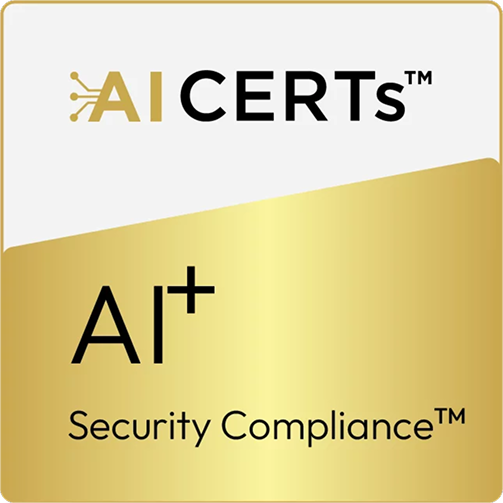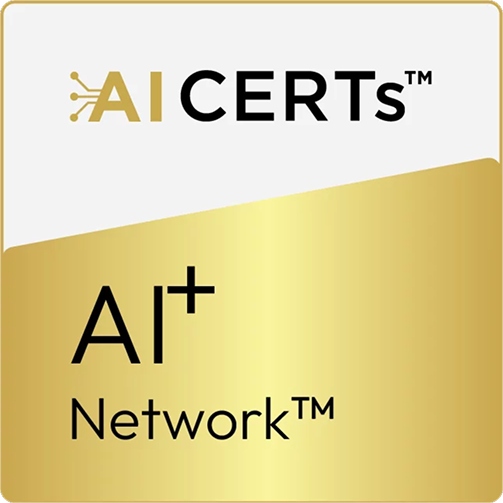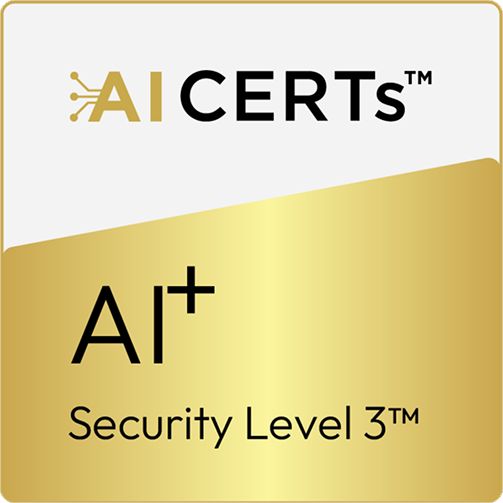AI+ Ethical Hacker™
# AT-220
Protect Digital Landscapes: Harness AI-Enhanced Technologies
- The AI+ Ethical Hacker™ certification delves into the intersection of cybersecurity and artificial intelligence, a pivotal juncture in our era of rapid technological progress. Tailored for budding ethical hackers and cybersecurity experts, it offers comprehensive insights into AI's transformative impact on digital offense and defense strategies. Unlike conventional ethical hacking courses, this program harnesses AI's power to enhance cybersecurity approaches. It caters to tech enthusiasts eager to master the fusion of cutting-edge AI methods with ethical hacking practices amidst the swiftly evolving digital landscape. The curriculum encompasses four key areas, from course objectives and prerequisites to anticipated job roles and the latest AI technologies in Ethical Hacking.
- Certification Duration: 40 hours (5 Days)
Why This Certification Matters
- Stay Ahead of Technological Advancements: Learn how AI is transforming cybersecurity, enabling you to stay at the forefront of evolving threats.
- Boost Career Opportunities: This certification prepares you for high-demand roles at the intersection of AI and cybersecurity.
- Future-Proof Your Skills: Master AI-powered ethical hacking, positioning yourself as an expert in a rapidly advancing digital landscape.
- Bridge the Gap Between AI and Cybersecurity: Gain expertise in combining AI techniques with ethical hacking to improve digital defense strategies.
- Hands-on Approach: Learn practical applications of AI-driven security methods, ensuring you're equipped to tackle real-world cyber threats.
Prerequisites
- Programming Proficiency: Knowledge of Python, Java, C++, etc for automation and scripting.
- Networking Fundamentals: Understanding of networking protocols, subnetting, firewalls, and routing.
- Operating Systems Knowledge: Proficiency in using Windows and Linux operating systems.
- Cybersecurity Basics: Familiarity with fundamental cybersecurity concepts, including encryption, authentication, access controls, and security protocols.
- Machine Learning Basics: Understanding of machine learning concepts, algorithms, and basic implementation.
- Web Technologies: Understanding of web technologies, including HTTP/HTTPS protocols, and web servers.
- There are no mandatory prerequisites for certification. Certification is based solely on performance in the examination. However, candidates may choose to prepare through self-study or optional training offered by AI CERTS Authorized Training Partners (ATPs).
Exam Policies & Integrity
- Before your exam, you must accept the AI CERTs™ Candidate Agreement. It ensures fairness, transparency, and unbiased certification for all candidates.
- Please review it in advance to understand our exam standards and your responsibilities.
Available Dates
Exam Details
Modules
12
Examination
1
50 MCQs
90 Minutes
Passing Score
70% (35/50)
Recertification Requirements
- AI CERTs requires recertification every year to keep your certification valid. Notifications will be sent three months before the due date, and candidates must follow the steps in the candidate handbook to complete the process.
- Need Help? If you have any questions or need assistance with recertification, please reach out to our support team at support@aicerts.ai
Certification Modules
Certification Overview
- Course Introduction
Module 1: Foundation of Ethical Hacking Using Artificial Intelligence (AI)
- 1.1 Introduction to Ethical Hacking
- 1.2 Ethical Hacking Methodology
- 1.3 Legal and Regulatory Framework
- 1.4 Hacker Types and Motivations
- 1.5 Information Gathering Techniques
- 1.6 Footprinting and Reconnaissance
- 1.7 Scanning Networks
- 1.8 Enumeration Techniques
Module 2: Introduction to AI in Ethical Hacking
- 2.1 AI in Ethical Hacking
- 2.2 Fundamentals of AI
- 2.3 AI Technologies Overview
- 2.4 Machine Learning in Cybersecurity
- 2.5 Natural Language Processing (NLP) for Cybersecurity
- 2.6 Deep Learning for Threat Detection
- 2.7 Adversarial Machine Learning in Cybersecurity
- 2.8 AI-Driven Threat Intelligence Platforms
- 2.9 Cybersecurity Automation with AI
Module 3: AI Tools and Technologies in Ethical Hacking
- 3.1 AI-Based Threat Detection Tools
- 3.2 Machine Learning Frameworks for Ethical Hacking
- 3.3 AI-Enhanced Penetration Testing Tools
- 3.4 Behavioral Analysis Tools for Anomaly Detection
- 3.5 AI-Driven Network Security Solutions
- 3.6 Automated Vulnerability Scanners
- 3.7 AI in Web Application
- 3.8 AI for Malware Detection and Analysis
- 3.9 Cognitive Security Tools
Module 4: AI-Driven Reconnaissance Techniques
- 4.1 Introduction to Reconnaissance in Ethical Hacking
- 4.2 Traditional vs. AI-Driven Reconnaissance
- 4.3 Automated OS Fingerprinting with AI
- 4.4 AI-Enhanced Port Scanning Techniques
- 4.5 Machine Learning for Network Mapping
- 4.6 AI-Driven Social Engineering Reconnaissance
- 4.7 Machine Learning in OSINT
- 4.8 AI-Enhanced DNS Enumeration & AI-Driven Target Profiling
Module 5: AI in Vulnerability Assessment and Penetration Testing
- 5.1 Automated Vulnerability Scanning with AI
- 5.2 AI-Enhanced Penetration Testing Tools
- 5.3 Machine Learning for Exploitation Techniques
- 5.4 Dynamic Application Security Testing (DAST) with AI
- 5.5 AI-Driven Fuzz Testing
- 5.6 Adversarial Machine Learning in Penetration Testing
- 5.7 Automated Report Generation using AI
- 5.8 AI-Based Threat Modeling
- 5.9 Challenges and Ethical Considerations in AI-Driven Penetration Testing
Module 6: Machine Learning for Threat Analysis
- 6.1 Supervised Learning for Threat Detection
- 6.2 Unsupervised Learning for Anomaly Detection
- 6.3 Reinforcement Learning for Adaptive Security Measures
- 6.4 Natural Language Processing (NLP) for Threat Intelligence
- 6.5 Behavioral Analysis using Machine Learning
- 6.6 Ensemble Learning for Improved Threat Prediction
- 6.7 Feature Engineering in Threat Analysis
- 6.8 Machine Learning in Endpoint Security
- 6.9 Explainable AI in Threat Analysis
Module 7: Behavioral Analysis and Anomaly Detection for System Hacking
- 7.1 Behavioral Biometrics for User Authentication
- 7.2 Machine Learning Models for User Behavior Analysis
- 7.3 Network Traffic Behavioral Analysis
- 7.4 Endpoint Behavioral Monitoring
- 7.5 Time Series Analysis for Anomaly Detection
- 7.6 Heuristic Approaches to Anomaly Detection
- 7.7 AI-Driven Threat Hunting
- 7.8 User and Entity Behavior Analytics (UEBA)
- 7.9 Challenges and Considerations in Behavioral Analysis
Module 8: AI Enabled Incident Response Systems
- 8.1 Automated Threat Triage using AI
- 8.2 Machine Learning for Threat Classification
- 8.3 Real-time Threat Intelligence Integration
- 8.4 Predictive Analytics in Incident Response
- 8.5 AI-Driven Incident Forensics
- 8.6 Automated Containment and Eradication Strategies
- 8.7 Behavioral Analysis in Incident Response
- 8.8 Continuous Improvement through Machine Learning Feedback
- 8.9 Human-AI Collaboration in Incident Handling
Module 9: AI for Identity and Access Management (IAM)
- 9.1 AI-Driven User Authentication Techniques
- 9.2 Behavioral Biometrics for Access Control
- 9.3 AI-Based Anomaly Detection in IAM
- 9.4 Dynamic Access Policies with Machine Learning
- 9.5 AI-Enhanced Privileged Access Management (PAM)
- 9.6 Continuous Authentication using Machine Learning
- 9.7 Automated User Provisioning and De-provisioning
- 9.8 Risk-Based Authentication with AI
- 9.9 AI in Identity Governance and Administration (IGA)
Module 10: Securing AI Systems
- 10.1 Adversarial Attacks on AI Models
- 10.2 Secure Model Training Practices
- 10.3 Data Privacy in AI Systems
- 10.4 Secure Deployment of AI Applications
- 10.5 AI Model Explainability and Interpretability
- 10.6 Robustness and Resilience in AI
- 10.7 Secure Transfer and Sharing of AI Models
- 10.8 Continuous Monitoring and Threat Detection for AI
Module 11: Ethics in AI and Cybersecurity
- 11.1 Ethical Decision-Making in Cybersecurity
- 11.2 Bias and Fairness in AI Algorithms
- 11.3 Transparency and Explainability in AI Systems
- 11.4 Privacy Concerns in AI-Driven Cybersecurity
- 11.5 Accountability and Responsibility in AI Security
- 11.6 Ethics of Threat Intelligence Sharing
- 11.7 Human Rights and AI in Cybersecurity
- 11.8 Regulatory Compliance and Ethical Standards
- 11.9 Ethical Hacking and Responsible Disclosure
Module 12: Capstone Project
- 12.1 Case Study 1: AI-Enhanced Threat Detection and Response
- 12.2 Case Study 2: Ethical Hacking with AI Integration
- 12.3 Case Study 3: AI in Identity and Access Management (IAM)
- 12.4 Case Study 4: Secure Deployment of AI Systems
Optional Module: AI Agents for Ethical Hacking
- 1. Understanding AI Agents
- 2. Case Studies
- 3. Hands-On Practice with AI Agents
Tools

Acunetix

Wazuh

Shodan

OWASP ZAP
Exam Objectives
- AI-Integrated Cybersecurity Techniques:Learners will develop the ability to integrate AI tools and technologies into cybersecurity practices. This includes using AI for ethical hacking tasks such as reconnaissance, vulnerability assessments, penetration testing, and incident response.
- Threat Analysis and Anomaly Detection:Students will develop skills in applying machine learning algorithms to detect unusual patterns and behaviors that may indicate potential security threats. This capability is essential for proactively identifying and mitigating risks before they escalate.
- AI for Identity and Access Management (IAM): Learners will understand how to apply AI to enhance IAM systems, crucial for maintaining secure access to resources within an organization. This involves using AI to improve authentication processes and manage user permissions more dynamically and securely.
- Automated Security Protocol Optimization: Students will be equipped to utilize AI to dynamically adjust and optimize security protocols based on real-time data analysis and threat assessment. Learners will explore how AI algorithms can predict and respond to potential security breaches by automatically tweaking firewall rules, security configurations, and other protective measures.
Career Opportunities Post-Certification
- Median Salaries : $113,151
- With AI Skills : $146,430
- % Difference : 29
Security Researcher
Investigates AI-driven security solutions, explores emerging threats, and develops innovative cybersecurity defense mechanisms.
Vulnerability Assessment Specialist
Specializes in AI-powered assessments to identify, analyze, and prioritize security vulnerabilities in technology infrastructures.
Cybersecurity Analyst
Analyzes cyber threats using AI tools, monitors security systems, and recommends solutions to enhance network safety.
Penetration Tester
Uses AI to identify and exploit vulnerabilities in systems, ensuring robustness against potential cyberattacks.
AI Security Career Advancement – Your Path to Cyber Resilience
- Market Demand for AI Security Experts
- As AI technologies integrate into critical industries, ethical hackers proficient in AI security are in high demand.
- Cyber threats targeting AI-powered applications are rapidly evolving, making AI cybersecurity specialists essential for organisations.
- Key Growth Areas: AI-driven penetration testing, AI model adversarial attacks, AI fraud prevention, and AI-powered security monitoring.
- The gap between AI innovation and security expertise is widening, positioning AI Ethical Hackers as a high-value career path.

Smart Solutions for AI- Powered Credentials

- Secure, tamper-proof certifications with blockchain technology and Al integration. Instant verification and custom designs for your brand.

- Al-enhanced proctoring for reliable assessments with automated integrity checks and live monitoring. Powering the future of certifications with Al and blockchain.
Trusted LinkedIn Reviews Posted by Our Learners

Sheikh Raashid Javid
ITF+, A+, N+, Cloud+, Security+, CYSA+, Pentest+, CND, CSA, CEH, ECSA, ECIH, CHFI, CTIA, EDRP, ECES, ECSS, AZ-900, AZ-104, CSX, CCIO, ISO 27001, SC-900
I’m excited to share that I have officially earned my AI+ Foundation Certification from AI Certs! AI CERTs™ AI CERTs™ - India Ai Certs To achieve this milestone, I completed five intensive modules, listened to in-depth podcasts for each, and explored additional learning resources to deepen my understanding. A big thank you to NetCom Learning and AI CERTs™ for providing me with this opportunity to enhance my skills and knowledge in the field of AI. This certification marks an important step in my AI journey, and I look forward to applying these insights to real-world challenges and future innovations!

Discover Your Ideal Role-Based Certifications and Programs!
Not sure which certifications to go for? Take our quick assessment to discover the perfect role-based certifications and programs tailored just for you.
Frequently Asked Questions
What are the key benefits of this certification?
- Participants gain comprehensive insights into AI's role in cybersecurity, learning advanced techniques that are essential in modern ethical hacking practices. The certification equips learners with cutting-edge skills highly valued in the cybersecurity industry.
Who should consider taking the AI+ Ethical Hacker™ certification?
- This certification is ideal for aspiring ethical hackers and cybersecurity professionals who want to integrate AI technologies into their skill set. It caters to tech enthusiasts looking to stay ahead in the rapidly evolving digital landscape.
What practical skills will I gain from this certification?
- Participants will gain hands-on experience in using AI to enhance ethical hacking techniques. Skills include AI-driven reconnaissance, vulnerability assessment, penetration testing, threat analysis, incident response, and identity and access management. Additionally, participants will learn to secure AI systems and address ethical considerations in AI and cybersecurity.
What are the prerequisites for enrolling in this course?
- Basic knowledge of cybersecurity principles and familiarity with programming languages such as Python are recommended. Prior experience in ethical hacking or AI is advantageous but not mandatory
How is this course different from traditional ethical hacking courses?
- Unlike traditional courses, this certification uniquely integrates AI technologies into ethical hacking practices. It focuses on leveraging AI's capabilities to enhance cybersecurity measures, providing a forward-looking approach to digital defense.







